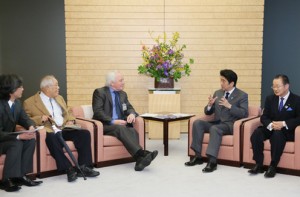
From left: Hitoshi Murayama, LCC Deputy Director, Masatoshi Koshiba, 2002 Nobel laureate in Physics, Lyn Evans, Shinzo Abe, and Takeo Kawamura, Chair of the Diet members association for ILC. Images: Prime Minister of Japan and His Cabinet
Our recent meeting with Prime Minister Shinzo Abe was a very special moment for me. He said a linear collider was a dream for humankind.
The moment happened when LCC Director Lyn Evans visited Japan for three days at the end of March to meet many dignitaries. He had come to invite Japan to host the International Linear Collider. I had the privilege to join him in some of the meetings, basically as Lyn’s Japanese voice, but also representing the US community of particle physicists.
Lyn thanked Mr. Abe that Japanese contribution to the Large Hadron Collider (editor’s note: Lyn Evans used to be Project Manager of CERN’s LHC) was the first one announced outside the CERN member states, which helped his negotiation with other partners. He also pointed out that at the same time Japanese industry was critical in making the LHC happen at all. Eventually, Japanese industry benefited from this contribution in gaining international stature and experience working on the cutting-edge research project that involves about ten thousand people from around the world. Some of the products developed for this purpose turned out profits to some companies too.
Then Lyn moved to the next point, stating that hosting a linear collider would give Japan the opportunity to receive wide international recognition as a leader in fundamental science as well as involvement of scientists and industry from all over the world. It would also bring many non-Japanese scientists and their families to Japan, in the same way it happens at CERN. This kind of recognition and attention is what Japan has been eager to receive.
Finally Lyn pointed out that Europe could not host this attractive project at this point because it is tied up in the LHC for the foreseeable future. The draft of the European Strategy update document, the final version of which will be adopted by CERN Council in May, says “The initiative from the Japanese particle physics community to host the ILC in Japan is most welcome, and European groups are eager to participate. Europe looks forward to a proposal from Japan to discuss a possible participation.” I added that the US was also under tremendous pressure to reduce the budget deficit and was not likely to host ILC either. The recent report from the High Energy Physics Advisory Panel of US Departement of Energy on future facilities evaluated the ILC to be “absolutely central” to the field, and added “The initiative from the Japanese particle physics community to host the ILC in Japan is very welcome, and the US particle physics community looks forward to a proposal from Japan to discuss possible participation.”
Masatoshi Koshiba, who received the Nobel Prize in Physics in 2002 for the pioneering work on neutrino astronomy, remarked that hosting the ILC would be a great opportunity for Japan when neither Europe nor US can do so. It would bring thousands of people from abroad, creating an international science city in Japan.
The Prime Minister promised to “monitor the development carefully,” and to evaluate “what role Japan can play.” We were all tremendously encouraged by these remarks.
In addition to the Prime Minister, we met Hakubun Shimomura, Minister of Ministry of Education, Culture, Sports, Science and Technology, Itta Yamamoto, Minister of State for Special Missions in charge of science and technology policy, and many other politicians. The level of attention ILC receives in Japan is quite amazing.


Recent Comments